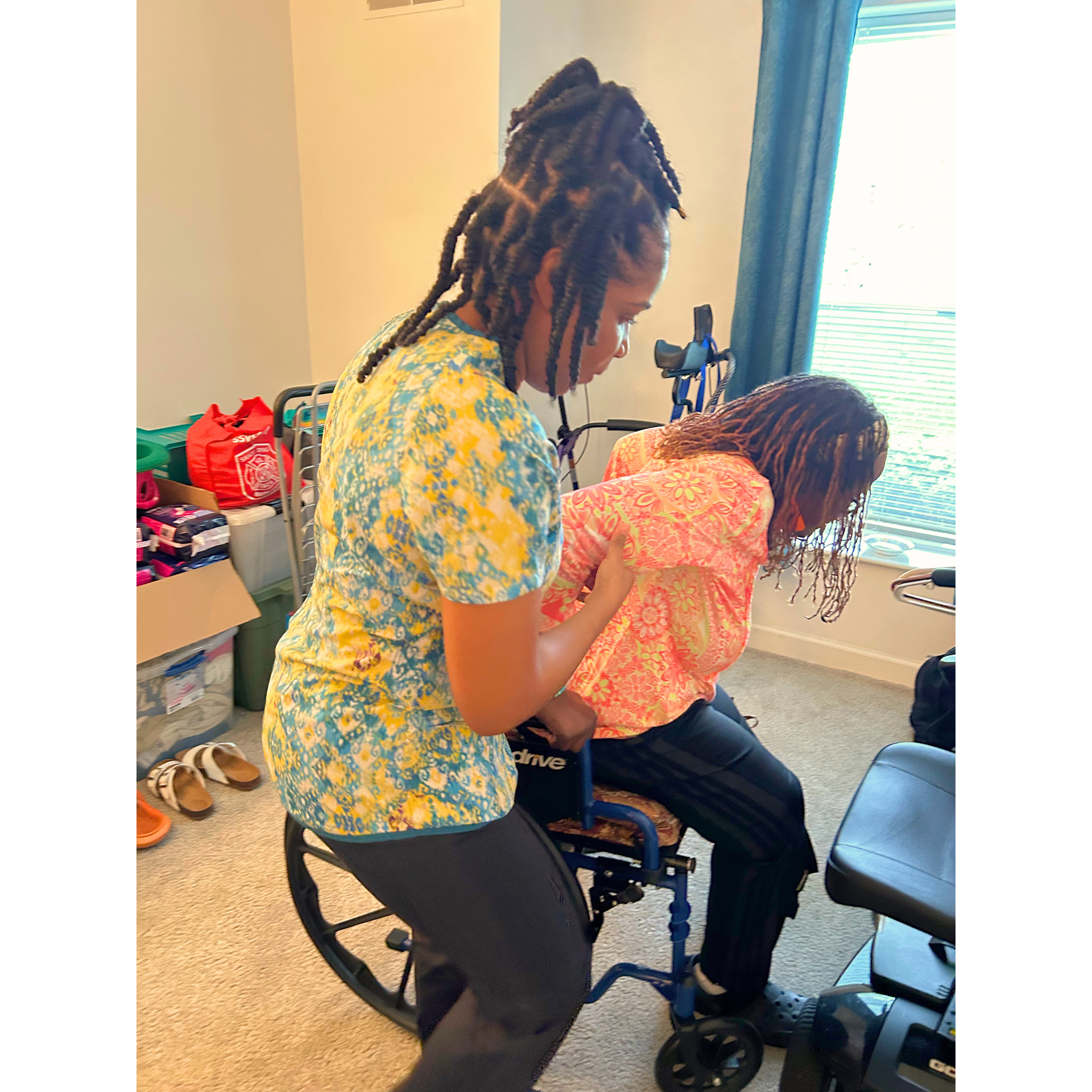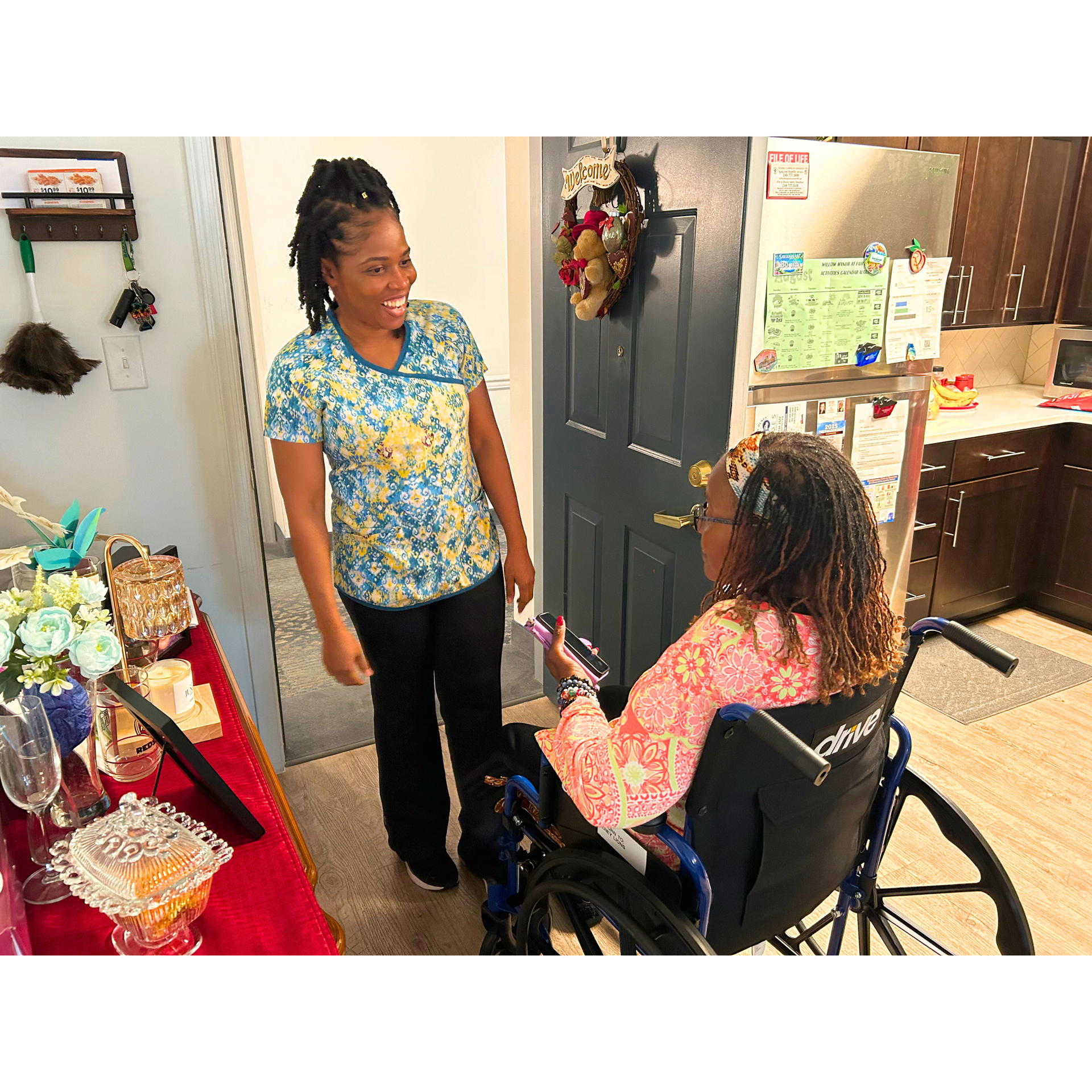October 22, 2025

If you’re reading this, there’s a good chance you’re a spouse, son, daughter, or close friend who’s beginning to notice memory changes in someone you love. You may be weighing hard options: devote a lot more time to caregiving for them, or bring in trusted in-home help (like ours).
When Alzheimer’s or dementia starts, it can progress quickly. Finding the proper care can be the difference between smooth and easy daily activities, and a challenging and stressful road ahead. That’s why we created this article: to help families like yours determine what their best choice is today.
Many families in Silver Spring, Rockville, and Potomac MD are unsure where to start looking for care for their loved one who has Alzheimer’s/dementia. Our mission is to help you make the best choices for your family based on knowledge and options. In this article, we’ll help you understand:
- The major signs and symptoms of mild vs severe Alzheimer’s/dementia
- The progression of Alzheimer’s/Dementia, and how to see worsening symptoms
- Which types of in-home care (and specific services) are best for each stage – with a checklist
- What you can do today to help your loved one
Signs & Symptoms of Mild Alzheimer’s/dementia
In early Alzheimer’s, many people still handle their life’s basic tasks but struggle with complex, multi-step tasks, time management, or safety awareness. National guidance emphasizes that many early-stage individuals can function independently, which is exactly why structured support, care, and planning can prevent crises later. [1]
Many of our patients who are in the early stages of Alzheimer’s & dementia experience: [2]
- Memory & orientation challenges: repeating questions, losing track of dates, getting lost in familiar places.
- Problems with understanding and solving complex tasks: difficulty managing bills, medications, calendars, transportation, and multi-step activities; tasks take longer.
- Reduced vocabulary and language skills: word-finding difficulty and trouble following conversations.
- Worrying judgment & safety: leaving the stove on, vulnerability to scams, poor financial decisions, wandering risk.
- Erratic mood & behavior: anxiety, apathy/withdrawal, changes in personality or awareness of symptoms.
In-Home Care is extremely common for those with mild Alzheimer’s/Dementia: about 80% use some form of in-home caregiving to help with daily life. [3]
Signs & Symptoms of Severe Alzheimer’s/Dementia
If your loved one has progressed to late-stage Alzheimer’s or severe dementia, they often experience loss of verbal ability, need total help for activities of daily living, develop swallowing difficulties, experience more infections, or have a combination of these symptoms: [4]
Communication: speech limited to a few words, and difficulty recognizing familiar people.
- Mobility: needs full assistance for moving & transfers, high risk of falling and contracture.
- Swallowing & nutrition: choking/coughing with meals, weight loss, dehydration risk.
- Continence: bowel & bladder incontinence, high skin-breakdown risk.
- Infections & complications: recurrent pneumonia, UTIs, fevers, infections. Hospitalizations are common and burdensome in this stage.
- Comfort & behavior: distress, agitation, sleep-wake reversals (“sundowning”), and pain that can be hard to detect without trained observation.
How Alzheimer’s Progresses: What to Expect & How We Help
Alzheimer’s generally moves from early (mild) → middle (moderate) → late (severe), with speed and exact symptoms varying for each person. Over half of those with Alzheimer’s receive regular in-home care or move to a nursing home within five years, on average. [5]
Many family members are not trained caregivers who know how to spot worsening symptoms, what treatments would be best for each, and provide the necessary care consistently. That’s often why families call us: we provide comprehensive assessments to determine your loved one’s needs, preferences, and what would be the most effective care to help them live their most fulfilling life. As care progresses, we regularly do reassessments and check-ins to determine if additional hours, care, or intervention is required. Through this, we can provide care to those of all levels of Alzheimer’s & dementia.
The Specific Care & Services Your Loved One May Need
Legend:
✅ = commonly helpful
✅✅ = very common, often essential
| Care & Service Name | Mild Alzheimer's/ dementia | Severe Alzheimer's/ dementia |
|---|---|---|
| Medication management & administration | ✅ | ✅✅ |
| Dysphagia (swallowing) & aspiration (breathing) care (45–86% in moderate–severe dementia) [6] | ✅ | ✅✅ |
| Bowel & bladder incontinence care (very common in severe dementia) [7] | ✅ | ✅✅ |
| Wound & injury care: pressure-injury prevention/treatment (up to ~40% experience in advanced dementia) [8] | ✅ | ✅✅ |
| Seizure/epilepsy care (~10–22% experience, higher in later stages) [9] | ✅ | |
| Infection monitoring & control: UTI/pneumonia (~41%of those with advanced dementia experience pneumonia) [10] | ✅ | ✅✅ |
| Depression, agitation, psychosis, aggression care (neuropsychiatric symptoms common; psychosis ~30% in severe Alzheimer’s) [11] | ✅ | ✅✅ |
| Vitals & red-flag escalation: change in mentation, fever, dehydration | ✅ | ✅✅ |
| Care coordination after ER/hospital discharge: med changes, aspiration/UTI risk | ✅ | ✅✅ |
| Comfort & daily activities: bathing, dressing, incontinence care, safe transfers, mobility | ✅ | ✅✅ |
| Fall-risk support (~45% with dementia report 1 or more falls/yr; higher with greater severity) [12] | ✅✅ | ✅✅ |
| Sleep support: nighttime supervision, routines (greater than 50% report sleep disturbance) [13] | ✅ | ✅✅ |
| Wandering prevention & elopement planning (about 60% wander at least once) [14] | ✅✅ | |
| Pain reduction support (50–80% of those with dementia say they have regular pain) [15] | ✅ | ✅✅ |
| Cognitive & functional support: cueing for IADLs, calendars, med reminders, supervised cooking | ✅ | ✅✅ |
| Home safety review: lighting, rugs, water temp, signage, bed/door alerts, “missing-person” plan | ✅ | ✅ |
| Caregiver coaching & respite: communication, de-escalation, safe turning/Hoyer, oral care, hydration prompts, infection warning signs | ✅ | ✅ |
| Transportation & escorted appointments | ✅ | ✅ |
| Complimentary nursing assessment & care plan: stage, depression/delirium screen, med review, fall-risk, written plan | ✅ | ✅✅ |
What You Can Do Today to Help Your Loved One
If you’re seeing any or a combination of the signs above, trust your instincts: early and personalized support can keep your loved one safer and more comfortable. A short conversation with a dementia-trained nurse can clarify what’s “normal,” what’s not, and which services really help at each stage. Specialty Care Services supports families across Montgomery County (Silver Spring, Rockville, Bethesda, Potomac, Gaithersburg, and nearby).
To schedule a complimentary initial consultation for you and your loved one, click here.
You’re not alone. We’re here to help you start the process of helping your loved one, can walk you through each step, and give you freedom by providing updated plans as your loved one’s needs change.
Sources
- National Institute on Aging.
https://www.nia.nih.gov/health/home-health-care
Accessed September 2025. - Alzheimer’s Association. 2024 Alzheimer’s Disease Facts and Figures.
https://www.alz.org/alzheimers-dementia/facts-figures
Accessed September 2025. - Centers for Disease Control and Prevention (CDC). Caregiving for Persons with Alzheimer’s Disease or Dementia.
https://www.cdc.gov/aging/caregiving/alzheimer.htm
Accessed September 2025. - Mayo Clinic. Alzheimer’s Disease – Symptoms and Causes.
https://www.mayoclinic.org/diseases-conditions/alzheimers-disease/symptoms-causes
Accessed September 2025. - National Library of Medicine (NIH). Disease Progression in Alzheimer’s and Dementia: Clinical Stages and Duration.
https://pubmed.ncbi.nlm.nih.gov
Accessed September 2025. - Alzheimer’s Research & Prevention Foundation. Stages of Alzheimer’s Disease.
https://www.alzheimersprevention.org/learn/stages-of-alzheimers-disease
Accessed September 2025. - Alzheimer’s Society UK. Continence and Toileting in Dementia.
https://www.alzheimers.org.uk/get-support/daily-living/continence-toileting
Accessed September 2025. - National Institutes of Health. Pressure Injuries in Alzheimer’s and Dementia Care.
https://www.ncbi.nlm.nih.gov/pmc/articles/PMC
Accessed September 2025. - Alzheimer’s Association. Seizures and Epilepsy in Alzheimer’s Disease.
https://www.alz.org/alzheimers-dementia/research_progress/clinical-trials/seizures-epilepsy
Accessed September 2025. - National Institute on Aging. Pneumonia and Infections in Older Adults with Dementia.
https://www.nia.nih.gov/health/lung-diseases/pneumonia-older-adults
Accessed September 2025. - Alzheimer’s Research UK. Behavioral and Psychological Symptoms of Dementia.
https://www.alzheimersresearchuk.org/dementia-information/symptoms/behavioral-symptoms/
Accessed September 2025. - National Council on Aging. Falls and Fall Prevention in Dementia.
https://www.ncoa.org/article/falls-prevention
Accessed September 2025. - Sleep Foundation. Sleep Problems and Alzheimer’s Disease.
https://www.sleepfoundation.org/physical-health/alzheimers-and-sleep
Accessed September 2025. - Alzheimer’s Association. Wandering and Getting Lost.
https://www.alz.org/help-support/caregiving/stages-behaviors/wandering
Accessed September 2025. - National Institute on Aging. Pain Management in People with Dementia.
https://www.nia.nih.gov/health/pain-dementia
Accessed September 2025.
Would you like me to format this in APA or AMA style instead (for inclusion in print or medical-style publications)?






